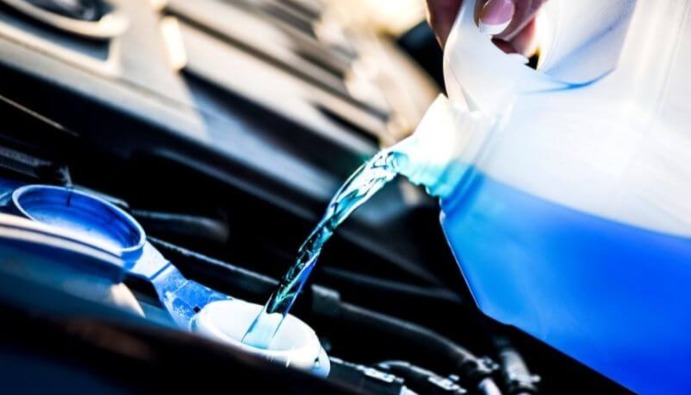Antifreeze Analysis

Antifreeze Analysis: Quality and Application with ASTM D3306
Antifreeze is a critical fluid that protects vehicle engines from freezing and overheating. Antifreeze solutions optimize the performance and life of the engine by regulating the freezing and boiling points of the water in the engine's cooling system. Since the quality of these fluids directly affects their performance, they must be analyzed in accordance with ASTM D 3306 standard.
What is antifreeze and why is it used?
Antifreeze is a mixture of glycol (usually ethylene glycol or propylene glycol) and water. It prevents the water from freezing in cold weather conditions and prevents the water from boiling in hot weather, making engine operation safe. Antifreeze also protects the metal components of the engine from rust and corrosion. However, if the additives and water-glycol ratio in antifreeze are not controlled according to certain standards, engine performance can be adversely affected. For this reason, the ASTM D 3306 standard specifies the quality criteria and methods of analysis for antifreeze.
ASTM D 3306 Standard: Quality Criteria for Antifreeze
ASTM D 3306 defines the requirements for antifreezes used for automotive engines. The standard specifies the basic properties of antifreeze solutions based on ethylene glycol and propylene glycol. These properties include freezing and boiling points, as well as corrosion protection and chemical stability.
The standard also covers the anti-corrosion effects of antifreezes on metals and their ability to be used for long life without damage to the cooling system. According to ASTM D 3306, the essential properties of an antifreeze are:
- Low freezing point
- High boiling point
- Providing effective protection against corrosion
- High chemical and thermal stability
- Far from the tendency to foam
Advantages of Antifreeze Analysis
Analyzing antifreeze offers many advantages in terms of engine health and performance:
- Long Engine Life: High-quality antifreeze extends the life of the engine's metal components as it provides effective protection against corrosion.
- Optimum Operating Performance: The freezing and boiling points are within the appropriate ranges, allowing the engine to run smoothly under different temperature conditions.
- Cost Savings: Regular monitoring of antifreeze quality prevents potential engine failures, which helps reduce maintenance costs.
- Environmental Benefit: Testing antifreeze at regular intervals reduces the amount of environmentally harmful waste and allows for less frequent replacement.
Selection and Use of Antifreeze in accordance with ASTM D 3306
Correct antifreeze selection and usage rates are important for the efficiency of the cooling system. Using antifreeze that complies with the standards prevents performance degradation by protecting the engine against different temperatures. In addition, complying with standards during antifreeze replacement and disposing of old antifreeze properly helps minimize environmental impacts.
Tests Applied in Antifreeze Analysis
A series of tests are applied to assess whether antifreeze solutions comply with the ASTM D 3306 standard. Here are these tests and the parameters analyzed:
|
Matrices
|
Test Name
|
Method
|
Principle
|
|
Antifreeze
|
Freezing Point Test
|
ASTM D3306
|
Antifreeze antifreeze effectiveness at low temperatures, determination of freezing point of ethylene glycol based solutions with water mixture.
|
|
Antifreeze
|
Boiling Point Test
|
ASTM D3306
|
Evaluation of the anti-boiling effect of antifreezes at high temperatures, measurement of the boiling point of the solution.
|
|
Antifreeze
|
pH Test
|
ASTM D3306
|
The pH value in antifreeze indicates the acidic or basic characteristic of the solution, which protects the internal metal parts of the engine against corrosion. The pH should be neutral or slightly basic, staying within certain limits.
|
|
Antifreeze
|
Corrosion Testing
|
ASTM D3306
|
It is verified that antifreeze solutions do not damage the metal surfaces of the engine such as copper, aluminum, steel.
|
|
Antifreeze
|
Foaming Test
|
ASTM D3306
|
Determining whether antifreeze solutions are prone to foaming ensures that the foam does not cause problems within the cooling system.
|
|
Antifreeze
|
Density Test
|
ASTM D3306
|
Determining whether the mixture of glycol and water is in the correct ratio, density measurement and the effect of the solution mixture on freezing and boiling points are evaluated.
|
Why NANOLAB?
NANOLAB always offers you the most reliable and fastest solution with its experience and strong infrastructure in antifreeze analysis in accordance with ASTM D3306 standard. Analyzes performed in accordance with ASTM D 3306 standard guarantee that the antifreeze fulfills its function without damaging the engine system. With our wide range of instruments and expert technical team, we accurately analyze the chemical components of antifreeze content, provide results that comply with all quality standards, and respond quickly and effectively. Thanks to our regulatory expertise, we fulfill ASTM D3306 and other legal requirements in the most accurate way, making your products compliant with international standards. Nanolab is the address where quality and speed meet in antifreeze analysis!

